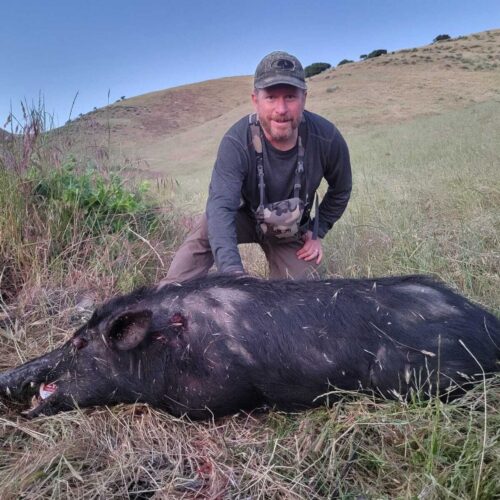
California’s Wildlife Management Programs aim to protect the state’s diverse ecosystems and maintain a healthy balance between wildlife populations and their habitats. These programs involve strategies like habitat conservation, species monitoring, and population control measures to ensure native species thrive while minimizing the negative impacts of invasive species and human activities.
Hog hunting is crucial in wildlife conservation by managing the population of invasive feral hogs, which cause significant ecological damage and economic losses. Conservative Game Management, dedicated to sustainable hunting practices, promotes responsible hog hunting as a wildlife management tool in California. Their efforts engage hunters, landowners, and the public in conservation activities that benefit the entire ecosystem.
Feral hogs, also known as wild boars or razorbacks, are a non-native species with established populations in California. These animals are highly destructive, rooting up land, damaging crops, and preying on native wildlife. Their foraging habits lead to soil erosion, water contamination, and the spread of invasive plants, disrupting ecosystems. Feral hogs also negatively impact endangered species by competing for food and habitat.
The economic consequences of unchecked feral hog populations are substantial, causing millions in damage to crops, infrastructure, and property annually. They can transmit diseases to livestock and humans, posing significant public health risks. Diseases like swine brucellosis, pseudorabies, and leptospirosis can spread from feral hogs to domestic animals and humans, leading to costly medical treatments and preventive measures.
Controlled hunting is an effective method for managing feral hog populations. By targeting these animals, hunters help reduce their numbers and mitigate ecological and economic impacts. Conservative Game Management promotes responsible hunting practices that prioritize wildlife conservation and sustainable management, educating hunters on the importance of population control and ecosystem balance.
Hog hunting in California is regulated by the California Department of Fish and Wildlife (CDFW), which sets guidelines for hunting seasons, bag limits, and methods. Ethical considerations, such as minimizing animal suffering and ensuring a fair chase, are emphasized by organizations like Conservative Game Management. Hunters are encouraged to use appropriate equipment and techniques for a quick and humane kill.
Innovative approaches are being explored to enhance hog hunting effectiveness, including drones for aerial surveillance, GPS tracking collars, and night vision equipment. These technologies help hunters locate and target feral hogs more efficiently, reducing the time and effort required to manage their populations.
California has seen successful hog hunting programs that have controlled feral hog populations in various regions. These programs often involve collaboration between state agencies, private landowners, and hunting organizations like Conservative Game Management. For example, coordinated hunting efforts in the Central Valley have significantly reduced hog numbers, improving crop yields and reducing habitat damage.
Collaboration with landowners and local communities is crucial for effective hog hunting programs. By working together, stakeholders can identify problem areas, develop targeted hunting strategies, and ensure hunting activities are conducted safely and responsibly. Community engagement builds support for conservation initiatives and fosters a sense of shared responsibility for protecting the environment.
Educational outreach is another important component of successful hog hunting programs. Workshops, seminars, and informational materials raise awareness about the impacts of feral hogs and the benefits of responsible hunting. By providing accurate information, organizations like Conservative Game Management promote informed decision-making and encourage participation in conservation efforts.
While hog hunting has proven effective, challenges remain, including the rapid reproduction rate of feral hogs, their adaptability, and the difficulty of accessing remote areas. Innovative solutions, such as technology for tracking and monitoring, may enhance hog hunting efforts. Research into new methods of population control, like fertility control and habitat modification, could provide additional tools for managing feral hogs.
Sustainable practices are essential for the long-term success of hog hunting as a wildlife management tool. Conservative Game Management advocates for responsible hunting methods that minimize environmental impact and ensure ethical treatment of animals. By balancing population control and conservation, hog hunting can preserve California’s biodiversity for future generations. Ongoing monitoring and assessment of hog populations ensure hunting efforts are effective and adaptive to changing conditions.
The involvement of diverse stakeholders, including government agencies, conservation organizations, hunters, and the public, is key to the future success of hog hunting programs. By fostering collaboration and communication, these groups can develop comprehensive strategies to address the challenges posed by feral hogs. Public policy and funding support are critical in sustaining these efforts and ensuring resources for research, education, and management activities.
Call to Action: If you’re interested in learning more about responsible California hog hunting and its role in wildlife management, contact Conservative Game Management at (805) 800-8182. Your involvement can make a difference in protecting California’s ecosystems and supporting sustainable wildlife management practices.
© Copyright 2023-Present Conservative Game Management. All rights reserved.
Hunting Outfitter Websites by Outdoor Marketers